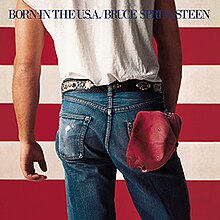Sheila Whiteley
As we have already noted, popular music artists play a special and important role in the creation of sexuality. There are a wide variety of types of artists who in some shape or form, aid in the reproduction and creation of new gender roles. This essay concentrated on the authentic, blue-collar, rock star and his function in the creation of masculinity - Bruce Springsteen being the most prevalent representation of this. Whiteley writes about how Bruce Springsteen went about representing masculinity in a time where much confusion surrounded (and continues to surround) the definition of masculinity. Through his creation of an image of authenticity, Springsteen created a relationship with his audience which brought about huge opportunity for influence particularly in this realm of hegemonic masculine identity.

Bruce Springsteen, in all his sweaty glory, created this aura of authenticity largely through live performances. He believed that a connection could be formed with his audience which was not achievable through music videos. Bruce was always reluctant to release music videos because they would not be an authentic representation and experience of his music. Because he created this sort of relationship with his fans, it could be said that he had an even greater influence on society than most other performers.
Unfortunately, this powerful influence had a negative impact on perceived masculinity and the role of women in society. In an attempt to hold strong to traditional masculinity, Springsteen's music often included lyrical themes of women as passive objects who needed to be rescued by a man. "Cover Me" is a perfect example of how men have found themselves in a time of "crisis," or confusion over what "true" manliness is. In this confusion the one thing they can resort back to is basically that women will always be there to have sex with you when you want them to.
The times are tough now, just getting tougher
This old world is rough, it's just getting rougher
Cover me, come on baby, cover me
Cover me, come on baby, cover me
Well I'm looking for a lover who will come on in and cover me
Promise me baby you won't let them find us
Hold me in your arms, let's let our love blind us
Cover me, shut the door and cover me
Well I'm looking for a lover who will come on in and cover me
Outside's the rain, the driving snow
I can hear the wild wind blowing
Turn out the light, bolt the door
I ain't going out there no more
This whole world is out there just trying to score
I've seen enough I don't want to see any more,
Cover me, come on and cover me
I'm looking for a lover who will come on in and cover me
Looking for a lover who will come on in and cover me
- What do you think the significance is of his role as the American poster child? How does imagery like that of his "Born In the USA" album cover affect his authenticity and in turn, his sexuality?
- Late in his career, how do you think Springsteen managed to toe the line between social commentary, and self exposure?
- How could he sing about social justice issues without outwardly admitting his own frustrations and his participation in the social production of masculinity?



No comments:
Post a Comment